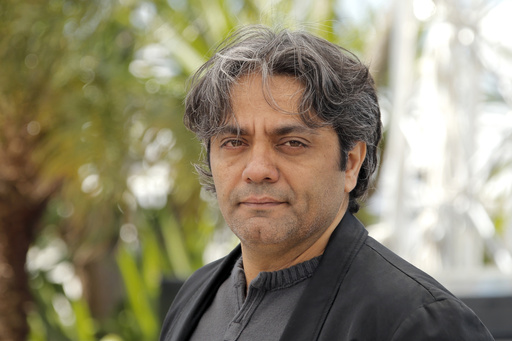The award-winning Iranian director Mohammad Rasoulof has been sentenced to eight years in prison and lashings just ahead of his planned trip to the Cannes film festival, his lawyer told The Associated Press Thursday.
Rasoulof, 51, known for his film “There Is No Evil,” has become the latest artist targeted in a widening crackdown on all dissent in the Islamic Republic following years of mass protests, including over the 2022 death of Mahsa Amini.
Iranian authorities haven’t acknowledged the sentence but Rasoulof and other artists had co-signed a letter urging authorities to “put your gun down” amid demonstrations over a 2022 building collapse that killed at least 29 people in the southwestern city of Abadan. In the time since then, artists, athletes, celebrities and others have been called for questioning or faced prison sentences.
“This judgment is issued due to Mr. Rasoulof signing statements in support of the Iranian people,” his lawyer Babak Paknia told the AP. He said that those statements, along with his tweets and further social activities, were found to be instances of ‘action against national security.’
Rasoulof faced trial in Tehran’s Revolutionary Court, Paknia added.
The tribunals, often handling cases of those with Western ties later used in prisoner swaps by Iran, have been internationally criticized for not allowing those on trial to pick their own lawyers or even see the evidence against them in closed-door hearings.
The director also faces lashings, fines and asset seizures, his lawyer said.
Iran’s mission to the United Nations did not respond to a request for comment over Rasoulof’s sentencing. He had been scheduled to head to Cannes for the premiere of his new film, “The Seed of the Sacred Fig,” later this month.
“There Is No Evil,” which tells four stories loosely connected to the use of the death penalty in Iran, won the Golden Bear prize at Berlin in 2020. Rasoulof wasn’t there to accept the award due to a travel ban imposed on him by Iranian authorities. Shortly after receiving the award, he was sentenced to a year in prison for three films he made that authorities found to be “propaganda against the system.”
He has faced repeated prison sentences and film bans in his native Iran, whose Shiite theocracy long has railed against Western-embraced artists as a part of a “soft war” against its policies. Yet Iran has become known on the international film circuit for daring, thought-provoking movies outlining the challenges of life in the Islamic Republic.
Fellow filmmaker Saeed Roustayi and his producer similarly faced legal action last year after traveling to Cannes to show “Leila’s Brothers.”
___
Associated Press writer Amir Vahdat in Tehran, Iran, contributed.
This website uses cookies so that we can provide you with the best user experience possible. Cookie information is stored in your browser and performs functions such as recognising you when you return to our website and helping our team to understand which sections of the website you find most interesting and useful.
